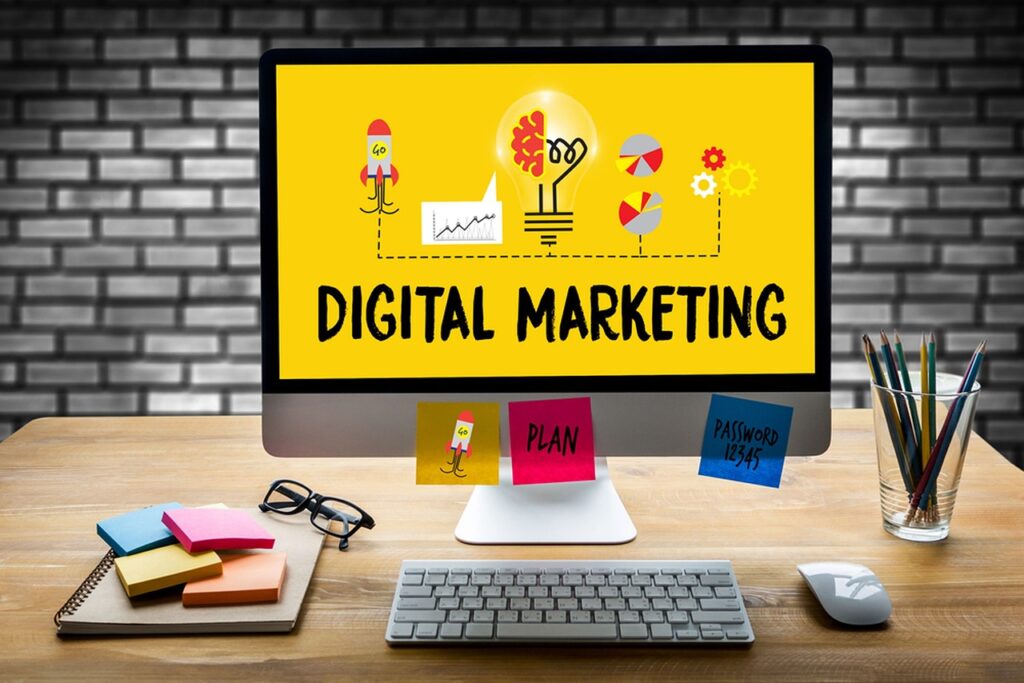Branding vs. Digital Marketing: Understanding the Key Differences
Building a successful business in today’s digital age requires a strong online presence, but many people often confuse two important concepts—branding and digital marketing. While both are essential for a company’s growth and visibility, they serve distinct purposes and involve different strategies. If you’re looking to strengthen your business or personal brand, understanding the differences between branding and digital marketing is critical. Let’s break down what each concept entails, how they differ, and why both are necessary for a comprehensive growth strategy. What is Branding? Branding goes beyond logos and color schemes. It’s the emotional and psychological relationship that your business forms with its customers. It represents the identity of your business—who you are, what you stand for, and what value you bring to the market. Key Elements of Branding: In essence, branding is all about shaping your company’s reputation, building customer loyalty, and creating a distinct identity in the marketplace. It’s long-term and foundational, guiding every touchpoint with your audience, from website design to customer service. What is Digital Marketing? Digital marketing, on the other hand, is the strategic use of online platforms and digital tools to promote your products or services and drive measurable actions. It’s about getting your brand in front of people through various digital channels and converting them into customers. Key Elements of Digital Marketing: SEO is the process of optimizing your website and content to rank higher in search engine results. Higher rankings increase visibility, driving more traffic to your site. Keywords, high-quality content, and technical SEO all play roles in improving your search rankings. PPC campaigns, like Google Ads or social media ads, allow businesses to bid on keywords or demographics to display ads to specific audiences. It’s an effective way to gain immediate visibility and drive traffic to your website. Social media platforms like Instagram, Facebook, LinkedIn, and Twitter are essential for engaging with your audience. Social media marketing involves creating and sharing content, interacting with followers, and running ads to promote products or services. Content marketing focuses on creating valuable, relevant content to attract and engage a target audience. Blog posts, videos, infographics, and webinars are all forms of content marketing that help educate and inform potential customers, subtly driving them toward making a purchase. Email marketing campaigns help nurture leads by sending targeted messages directly to your audience. With personalized offers, updates, and content, email marketing can drive conversions and keep your audience engaged over time. Digital marketing allows for real-time tracking and analytics. Tools like Google Analytics and social media insights provide valuable data on campaign performance, enabling businesses to adjust strategies based on what’s working and what isn’t. Digital marketing is more tactical and short-term in nature, often focused on specific goals like increasing sales, generating leads, or building brand awareness. It’s dynamic, data-driven, and constantly evolving as new platforms and technologies emerge. Key Differences Between Branding and Digital Marketing While branding and digital marketing often work hand-in-hand, they have distinct roles in a business’s overall strategy. Branding is focused on building a company’s identity and long-term reputation, while digital marketing is focused on short-term tactics to promote products or services and drive immediate results. Branding is a long-term, ongoing process that defines how your business is perceived over time. Digital marketing, on the other hand, involves specific campaigns with defined timelines and goals, often with immediate outcomes in mind. With branding, you have control over how you present your company—your logo, messaging, and values are directly in your hands. However, branding ultimately depends on how customers perceive your business. In digital marketing, you have more direct control over who sees your message through paid ads, search rankings, and targeted campaigns. Branding aims to create an emotional connection and loyalty among your customers, while digital marketing is more focused on measurable actions, such as clicks, conversions, and lead generation. Why Both Are Essential Branding and digital marketing are two sides of the same coin. A strong brand enhances the effectiveness of your digital marketing campaigns, while digital marketing efforts help expand your brand’s reach and visibility. When these two strategies work in harmony, they amplify each other. Final Thoughts While branding focuses on creating a lasting emotional connection with your audience, digital marketing drives short-term actions and measurable results. Understanding the differences between the two will help you create a more cohesive and effective strategy for building your business. By investing in both, you can ensure that your brand not only resonates with your target audience but also reaches them through the right channels, at the right time.
Branding vs. Digital Marketing: Understanding the Key Differences Read More »



